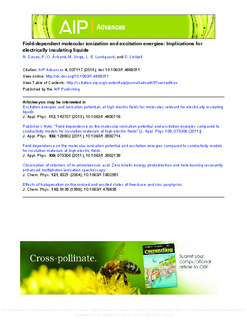Field-dependent molecular ionization and excitation energies: Implications for electrically insulating liquids
Journal article, Peer reviewed
Permanent lenke
http://hdl.handle.net/11250/2385347Utgivelsesdato
2014Metadata
Vis full innførselSamlinger
- Institutt for kjemi [1391]
- Publikasjoner fra CRIStin - NTNU [38013]
Sammendrag
Themolecular ionization potential has a relatively strong electric-field dependence as
compared to the excitation energies which has implications for electrical insulation
since the excited states work as an energy sink emitting light in the UV/VIS region.
At some threshold field, all the excited states of the molecule have vanished and
the molecule is a two-state system with the ground state and the ionized state,
which has been hypothesized as a possible origin of different streamer propagation
modes. Constrained density-functional theory is used to calculate the field-dependent
ionization potential of different types of molecules relevant for electrically insulating
liquids. The low singlet-singlet excitation energies of each molecule have also been
calculated using time-dependent density functional theory. It is shown that low-energy
singlet-singlet excitation of the type n→π* (lone pair to unoccupied π* orbital) has
the ability to survive at higher fields. This type of excitation can for example be found
in esters, diketones and many color dyes. For alkanes (as for example n-tridecane
and cyclohexane) on the other hand, all the excited states, in particular the σ →σ*
excitations vanish in electric fields higher than 10 MV/cm. Further implications for the
design of electrically insulating dielectric liquids based on the molecular ionization
potential and excitation energies are discussed.

